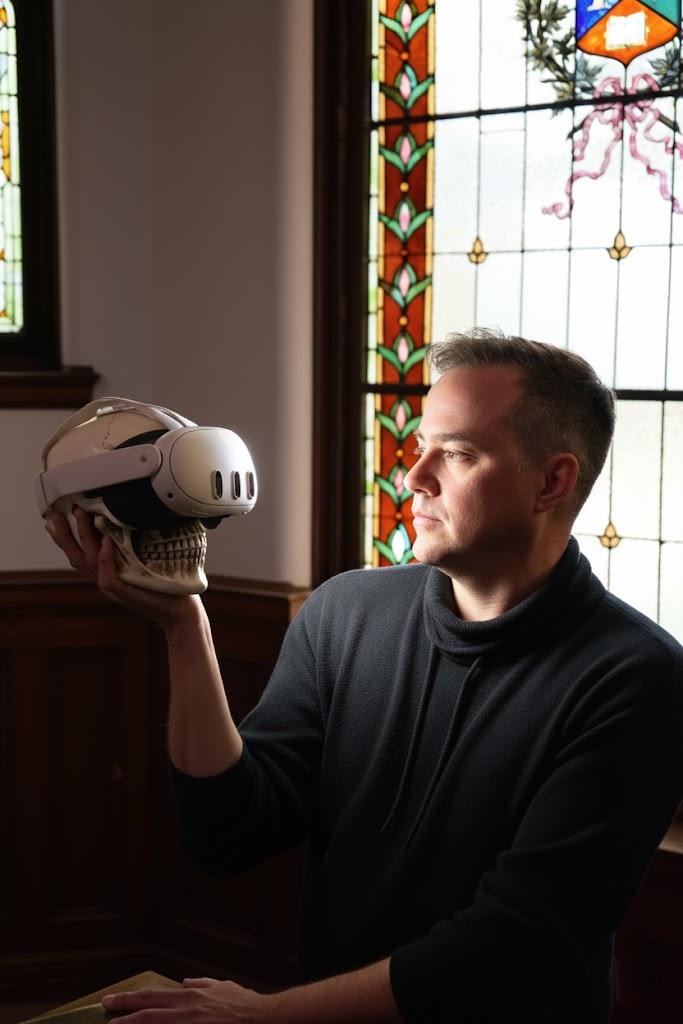Innovation of the Year
The Innovation of the Year award celebrates University of Guelph innovations that have created, or have the potential to create, meaningful value for Canada, with a focus on demonstrated impact beyond academia.
For this award, we define impact as the demonstrable contribution an innovation has made to society, health, the environment, or economic development - through the change it has enabled, informed, or inspired.
Since 2016, innovations representing work conducted by researchers across a variety of university departments have been recognized. These innovations continue to have a positive influence in diverse areas including animal health, food packaging, the environment, and human wellness.
NOTE: Nominations that are received remain in the nomination pool for consideration by the award review committee in subsequent years.
2025 Virtual Reality Shakespeare
Virtual reality theatre projects developed for high school and post-secondary students that allow them to feel like they are characters in Shakespeare's Hamlet and Macbeth have been named the 2025 Innovation of the Year.

Developed by Dr. Peter Kuling, Associate Professor in the School of Theatre, English, and Creative Writing in the College of Arts, this technology was codesigned with SimWave VR, an Ottawa-based company specializing in virtual reality development, which has since become part of Calian.
The project began during the Covid-19 pandemic, when the Government of Ontario launched a funding call for digital and innovative teaching projects that could be used in high schools, colleges, and universities. Dr. Kuling saw this as an opportunity to bring theatrical stage experiences to students digitally through VR. The result has been a powerful new way for Ontario students to engage with Shakespeare that is freely available in all Ontario schools and used by university educators from California to the United Kingdom. By transforming these classic plays into immersive, interactive performances, the project helps make Shakespeare accessible to all learners, no matter where they are.
This research was funded by the Ontario Exchange Network with several project collaborators, including Theatre Studies PhD students Alice Hinchliffe and Erin O'Brien, alumni including Gabriella Sundar-Singh, Kyle Blair, and Kyle Golemba, and acting company members from the Stratford and Shaw Festivals, who helped bring the virtual performances to life.
Photo: Dr. Peter Kuling. Courtesy of Michelle Stringer.

This project was built on collaboration and creativity, and the award truly belongs to everyone who worked together to make something innovative and inspiring. It's humbling to see an idea that grew through teamwork and imagination recognized as Innovation of the Year. This work is about expanding educational opportunities, supporting students and showing how the arts can innovate alongside technology.
Dr. Peter Kuling
Past Winners
Discover previous Innovation of the Year recipients
Dynasty Kidney Bean
Developed by Dr. Peter Pauls and research technician Tom Smith, with initial work by Dr. Tom Michaels, the U of G's Dynasty kidney bean emerged from a complex breeding process celebrated for its high yield, disease resistance and adaptability. The bean's success is supported by partnerships with Hensall District Co-operative Inc. and Ontario Bean Growers, which help bring this innovation to market. Recently, Dr. Pauls and his team released Gallantry, a new bean variety derived from a cross with Dynasty. Gallantry offers earlier maturation and a 2.7 percent yield improvement, making it a viable alternative for farmers in cooler or shorter-season regions.
U of G’s dry bean breeding program is underpinned by the cutting-edge research platform made possible by the Ontario Agri-Food Innovation Alliance, a collaboration between the Government of Ontario, Agricultural Research and Innovation Ontario (ARIO) and the University of Guelph. The Ontario Crops Research Centre is owned by the Government of Ontario through its agency, ARIO, and is managed by U of G through the Alliance.
Developed Techniques for Reducing Cattle Methane Emissions
Dr. Christine Baes, Dr. Flavio Schenkel, Dr. Saeed Shadpour, Dr. Filippo Miglior, and Dr. Francesca Malchiodi pioneered a national genetic evaluation system to identify dairy cattle with low methane emissions. By analyzing data on milk production, feed intake, methane output, fertility, health, and genomics, the team created a substantial reference population. They innovatively used mid-infrared reflectance spectroscopy (MIRS) from milk samples to predict individual cows' methane emissions accurately, paving the way for more sustainable dairy farming.
In the Know
Developed by Dr. Andria Jones-Bitton and Dr. Briana Hagen, "In the Know": A Mental Health Literacy program, is a bilingual agriculture-based mental health literacy training program aimed at farmers and anyone in the agriculture sector. Through this free workshop, participants cover topics of stress, depression, anxiety, substance use, and how to start a conversation around mental well-being. (Full Interview)
Environmental DNA Biomonitoring
Developed by Dr. Robert Hanner and his team, "Environmental DNA Biomonitoring" involves two reported inventions that were the foundation of a startup company called Precision Biomonitoring Inc. in 2017. As methods and tools for detecting DNA in environmental samples, these inventions are useful for monitoring the presence of species of interest. (Full Interview)
Novel Airlift Pump System
Developed by Dr. Wael Ahmed and brought to market by the start-up company FloNergia Inc., their novel airlift pump system does not contain any moving parts or require lubrication. This revolutionary modification has been optimized for multiple food applications and is currently in use at aquaculture facilities around the world where it significantly reduces energy and maintenance costs, creating more sustainable and economically viable practices.
Novel Yeast for Local Craft Beer
Developed by Dr. George van der Merwe and his team, they have optimized local strains of yeast for brewing. Commercialized through Escarpment Labs, this work has been applied to a diverse selection of specialized yeast strains for craft and industrial brewers alike, including wild Ontario yeast strains, which will improve the sustainability and economics of Canadian craft brewers who previously relied on imported yeast strains.
Whitebox Tools
Developed by Dr. John Lindsay, Whitebox Tools is advanced geospatial data analysis software. An open-source technology that is used around the world for applications that include wetlands mapping, landslide forecasting, soil erosion, and ice cover modelling. (Full Interview)
Waterless Decontamination System
Developed by Drs. Keith Warriner and Mahdiyeh Hasani alongside industry partner Clean Works, they created a waterless cleaning system to disinfect fruits and vegetables using hydrogen peroxide, ultraviolet light and ozone. This process was optimized for the cleaning of N95 masks and other PPE during the Covid-19 pandemic. (Full Interview)
| Year | Faculty | Description |
| 2019 | Dr. Dave Wolyn | Asparagus Varieties Under Dr. Wolyn's leadership and through is work with the breeding program, his Asparagus varieties have become the most popular kinds grown in North America that are fast gaining favour in Europe and Asia. |
| 2018 | Dr. Maira Medellin-Peña | Bacteria Reduction through Probiotics Pioneered by Drs. Griffiths and Medellin-Peñathe, this innovation used probiotics to reduce the spread of harmful bacteria, enhancing the health and welfare of livestock. |
| 2017 | Dr. John Dutcher | PhytoSpherix Nanoparticles which are non-toxic biodegradable and water-soluble. The PhytoSpherix technology was marketed by the formerly Guelph-based company Mirexus. |
| 2017 | Dr. Bonnie Mallard | High Immune Response Technology The breakthrough High Immune Response (HIR) technology that allows farmers to raise healthier animals that require less treatment and antibiotic use. |
| 2016 | Dr. Mario Monteiro | Carbohydrate-based Vaccine A carbohydrate-based vaccine that targets surface polysaccharides exposed by C. difficile. |
| 2016 | Compostable Resin A 100% compostable resin that can be used by industry to make items more sustainable, including single-serve pods for coffee and other hot beverages. |
